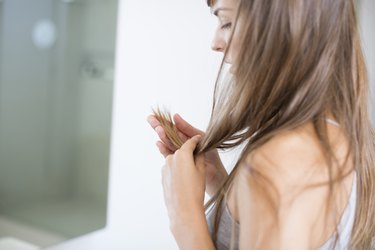
For many people, their head of hair is their glory and synonymous with beauty. So when your hair comes out easily, it can trigger worry and even fear.
Alarming as it may seem, the amount of hair that falls out every time you touch it is actually small — and this shedding is likely just a normal part of your hair's life cycle.
Video of the Day
Video of the Day
But if running your fingers through your hair causes abnormal hair loss, it may be due to styling habits or a potential health issue that needs to be addressed.
Your Hair's Life Cycle
Hair growth cycles through three different stages. Here's how it works:
- Anagen or growing phase: Most of your locks (about 90 to 95 percent) are in the anagen phase, which lasts two to eight years, per a September 2015 review in the Journal of Clinical & Diagnostic Research.
- Catogen or transitional phase: Next up is the transitional or catogen stage, and it's at this point that your hair stops growing and changes to the final stage over the course of several weeks.
- Telogen phase: The final stage lasts a couple of months and is the end point for hair growth. Five to ten percent of your hair resides in this final resting phase.
At the end of the telogen stage, your old strands of hair are pushed out of their follicles as new growth starts — and it's here in the cycle that hair comes out easily. Fun fact: Humans usually shed as many as 50 to 100 hairs each day during the telogen phase. This is a normal occurrance, per the American Academy of Dermatology, and this loss is most often noticed when you're washing, brushing or running fingers through your hair.
7 Reasons Your Hair Falls Out When You Touch It
There are a variety of reasons why hair comes out easily when pulled, per the Mayo Clinic, including those related to health, nutrition, stress and even difficult-to-resist urges. Here's more about each one:
1. Stress
Abnormal hair shedding may be due to a condition "called telogen effluvium, which is when hair sheds after a stressful period," says Mary Stevenson, MD, a dermatologist at NYU Langone Medical Center. Stressors can be physical or mental/emotional. Some common examples include severe illness (including Covid-19), rapid weight change, losing your job, the death of a loved one or going through a divorce. Pregnancy can also cause telogen effluvium.
2. Styling
Harsh chemical treatments like straightening or perms, as well as blow-drying, curling and tight hair styles can all cause hair shedding.
3. Showering
It's normal for hair to come out easily as you shampoo. And brushing hair after a shower, especially if you've ignored it for a few days, will result in many strands in your hands. However, excessive combing or brushing has been associated with hair loss, so it's best to be aware of how often you're doing it.
4. Medications
Certain drugs used to treat cancer, arthritis, high blood pressure, heart conditions and depression may cause shedding when you run fingers through your hair.
5. Health Issues
Pregnancy, childbirth, thyroid issues and menopause are just a few hormonal conditions that are linked to hair loss.
6. Nutrition
Low on iron, protein or vitamin D? A lack of these nutrients may be the culprit here.
7. Compulsion
The irresistible urge to pull on your own hair, a disorder called trichotillomania, goes beyond regular finger combing of your locks and can result in excessive hair loss and bald patches on your scalp.
What to Do if Your Hair Comes Out Easily
You can't circumvent the hair growth cycle, but you can take better care of you hair so it doesn't come out as easily. Here's what you can try:
1. Avoid Tugging
Pick a wide-toothed comb to detangle your hair, and refrain from mindlessly running your fingers through your hair or twisting it when you're bored. It's also a good practice to comb or brush your hair starting at the ends and moving toward the roots.
2. Use Gentle Products
Using a mild shampoo and applying conditioner each time you wash can help.
3. Skip the Heat
As hard as it may be to retire the flat iron or blow dryer, you hair will thank you.
4. Nix Chemicals
Perms, keratin treatments and dye can cause hair weakness and breakage.
5. Let It Down
Try not to scoop your hair into tight styles; instead, wear it loose and naturally.
6. Eat Right
Make sure protein, iron and vitamin D are a part of your daily diet for good hair health. Get to know the foods high in protein and foods high in iron, and eat them often.
7. Speak With a Doctor
If you detect an abnormal amount of hair shedding or loss — significantly more than 100 strands per day on average — speak with your doctor about potential causes and solutions.
8. Examine Your Habits
Working with a dermatologist, along with a psychologist or psychiatrist, may be a smart move, notes Dr. Stevenson. These professionals "can help with the behavior of repeatedly playing with hair, which some use as a comfort or in times of stress," she says.
- American Academy of Dermatology: Do You Have Hair Loss or Hair Shedding?
- American Academy of Dermatology: Hair Loss
- Journal of Clinical and Diagnostic Research: Telogen Effluvium: A Review
- American Family Physician: Diagnosing and Treating Hair Loss
- Mayo Clinic: Hair Loss
- Mayo Clinic: Trichotillomania (Hair-Pulling Disorder)
- Mary Stevenson, MD, dermatologist
Is this an emergency? If you are experiencing serious medical symptoms, please see the National Library of Medicine’s list of signs you need emergency medical attention or call 911.